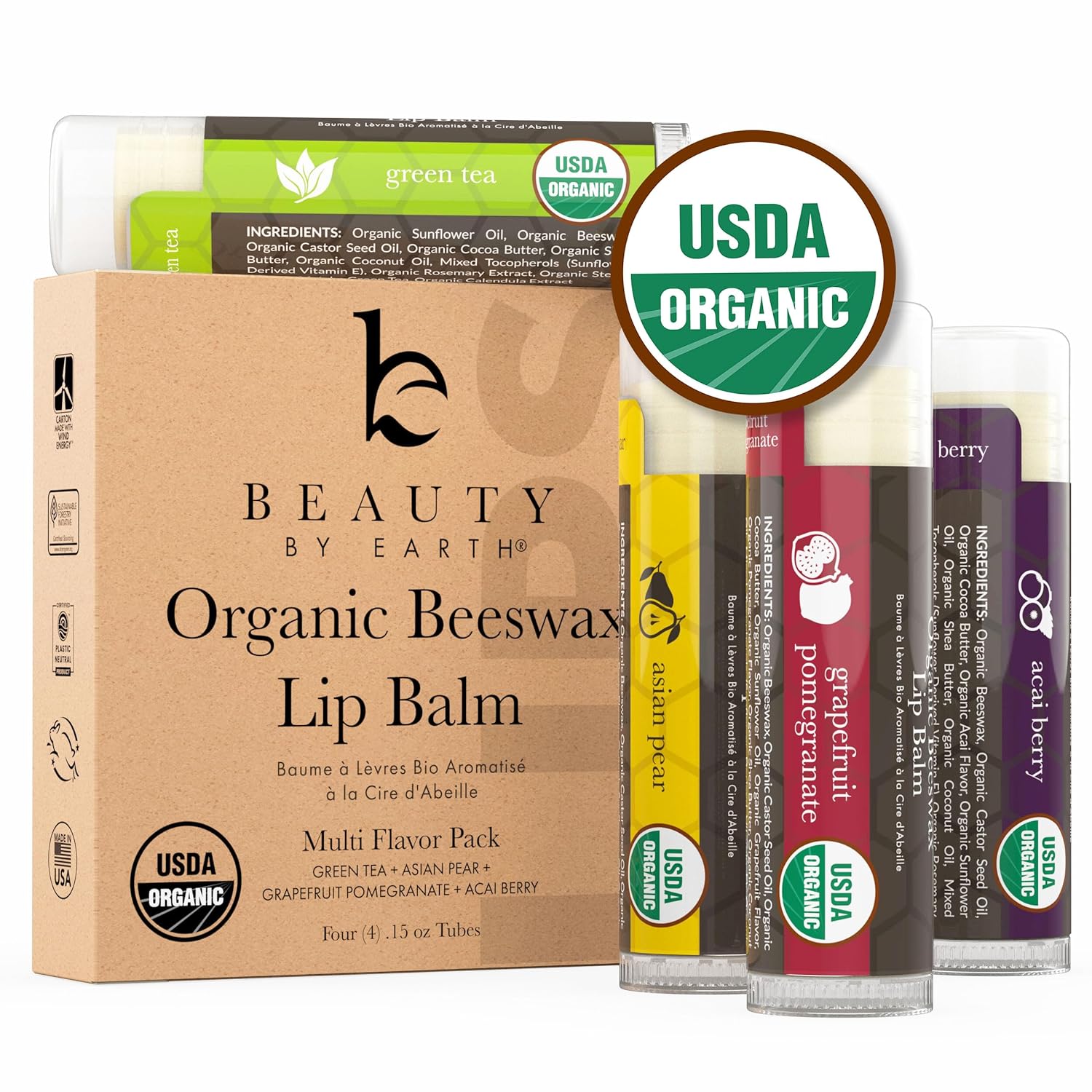
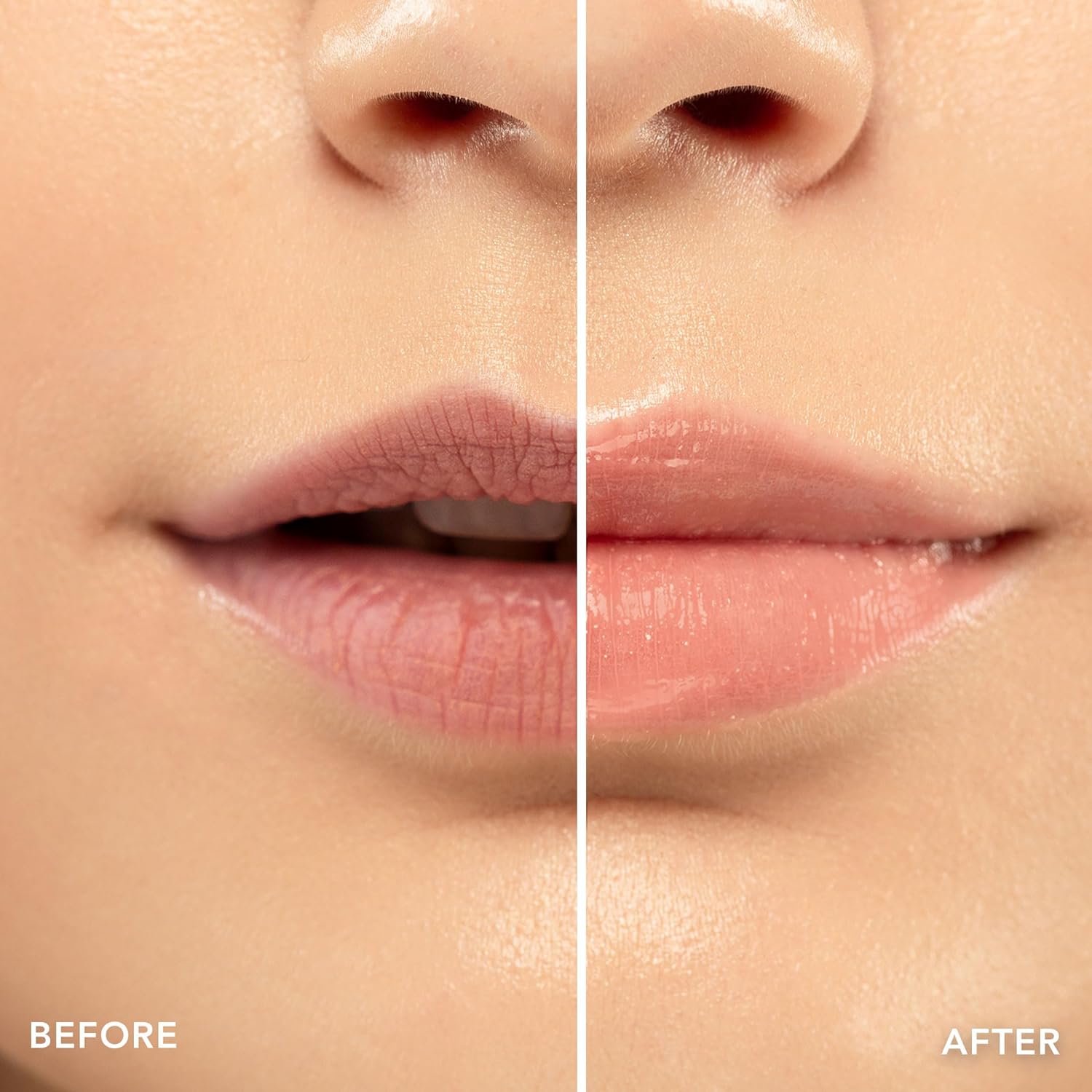
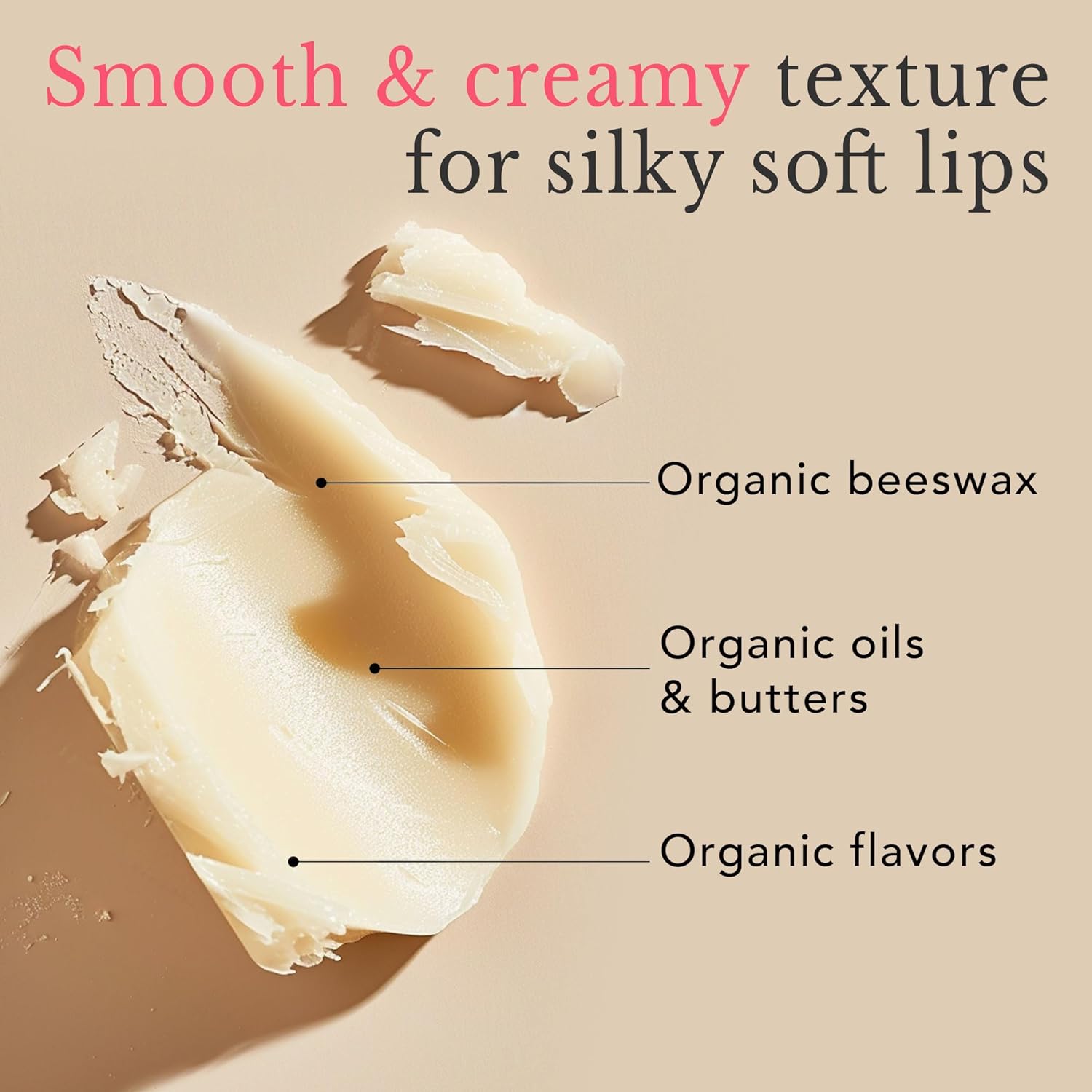
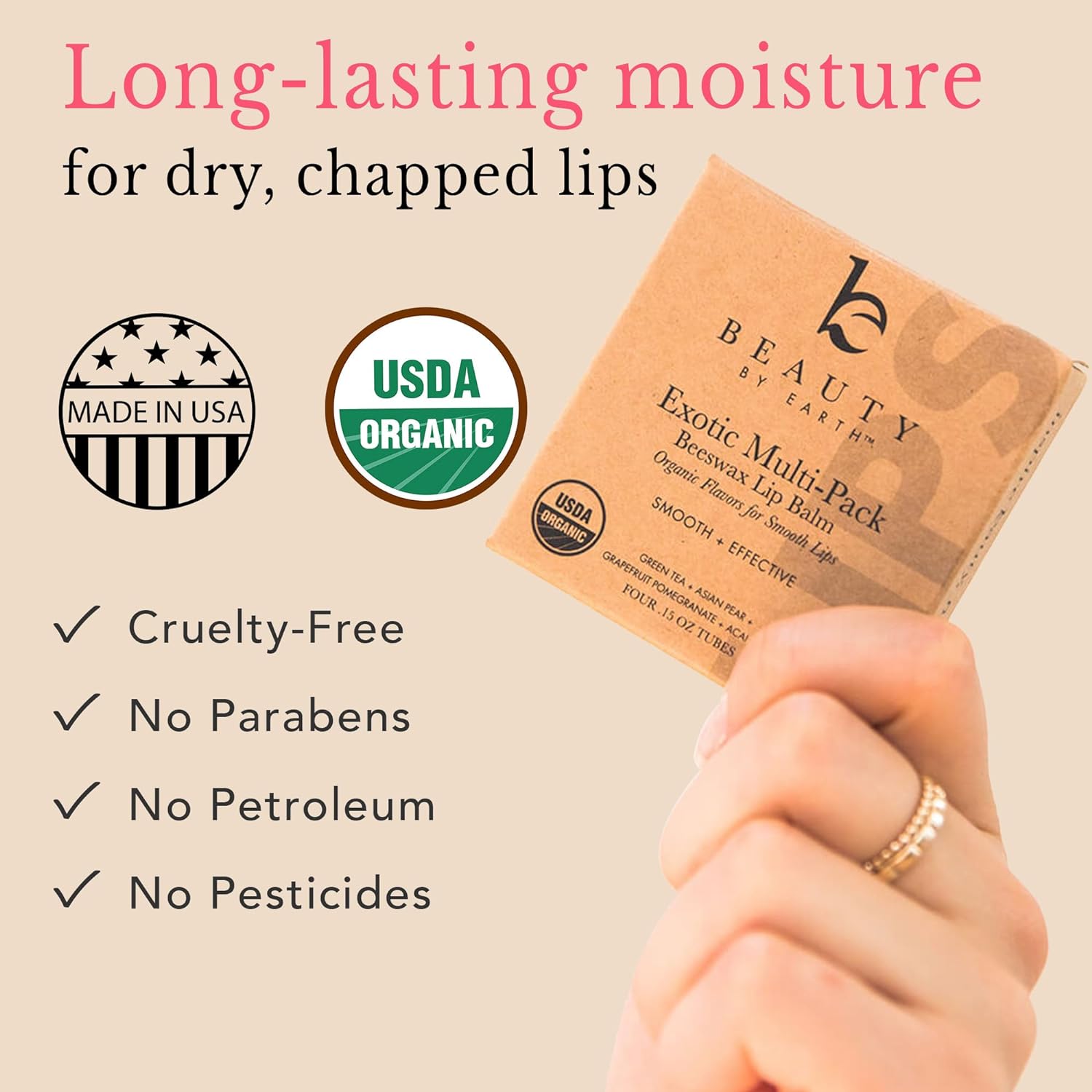
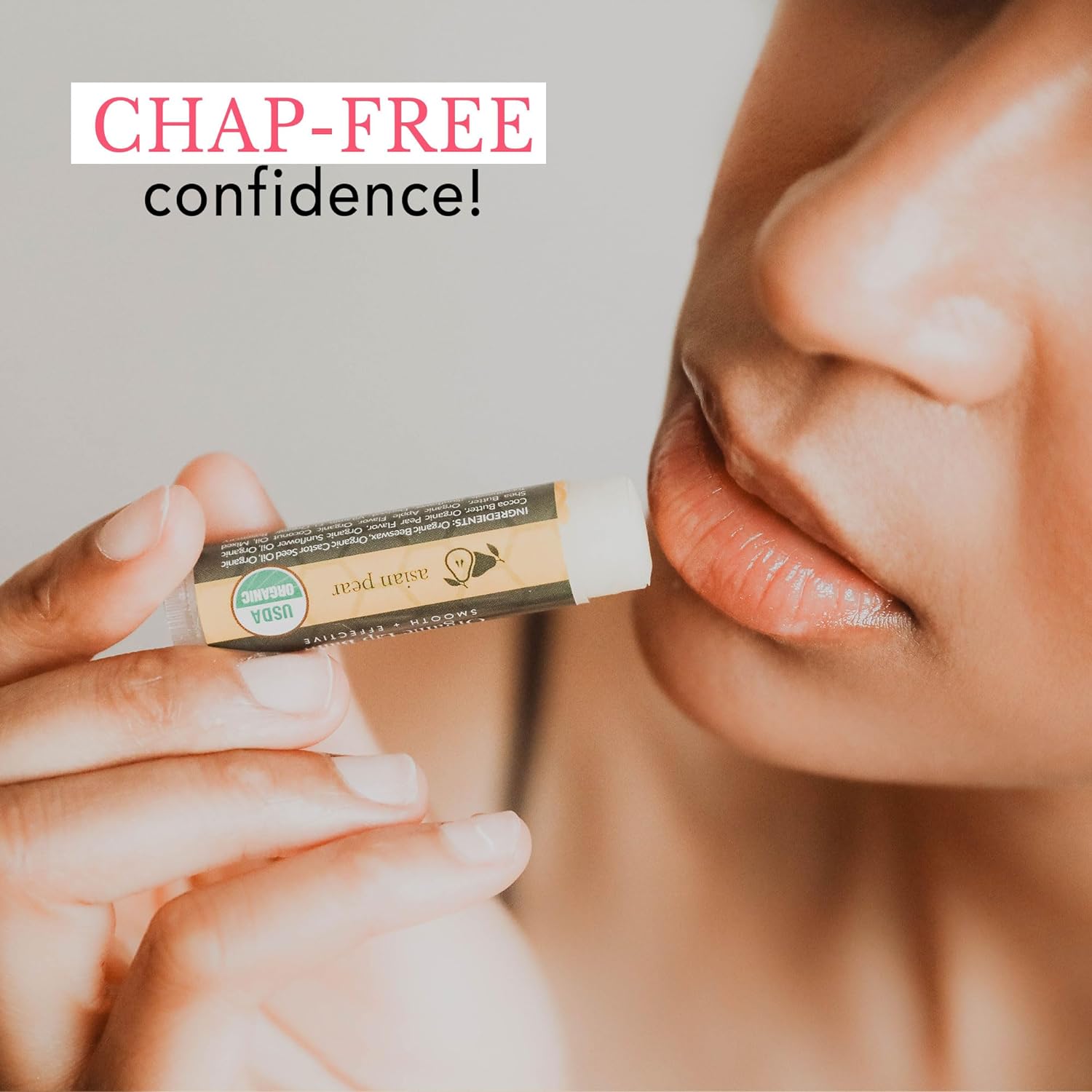
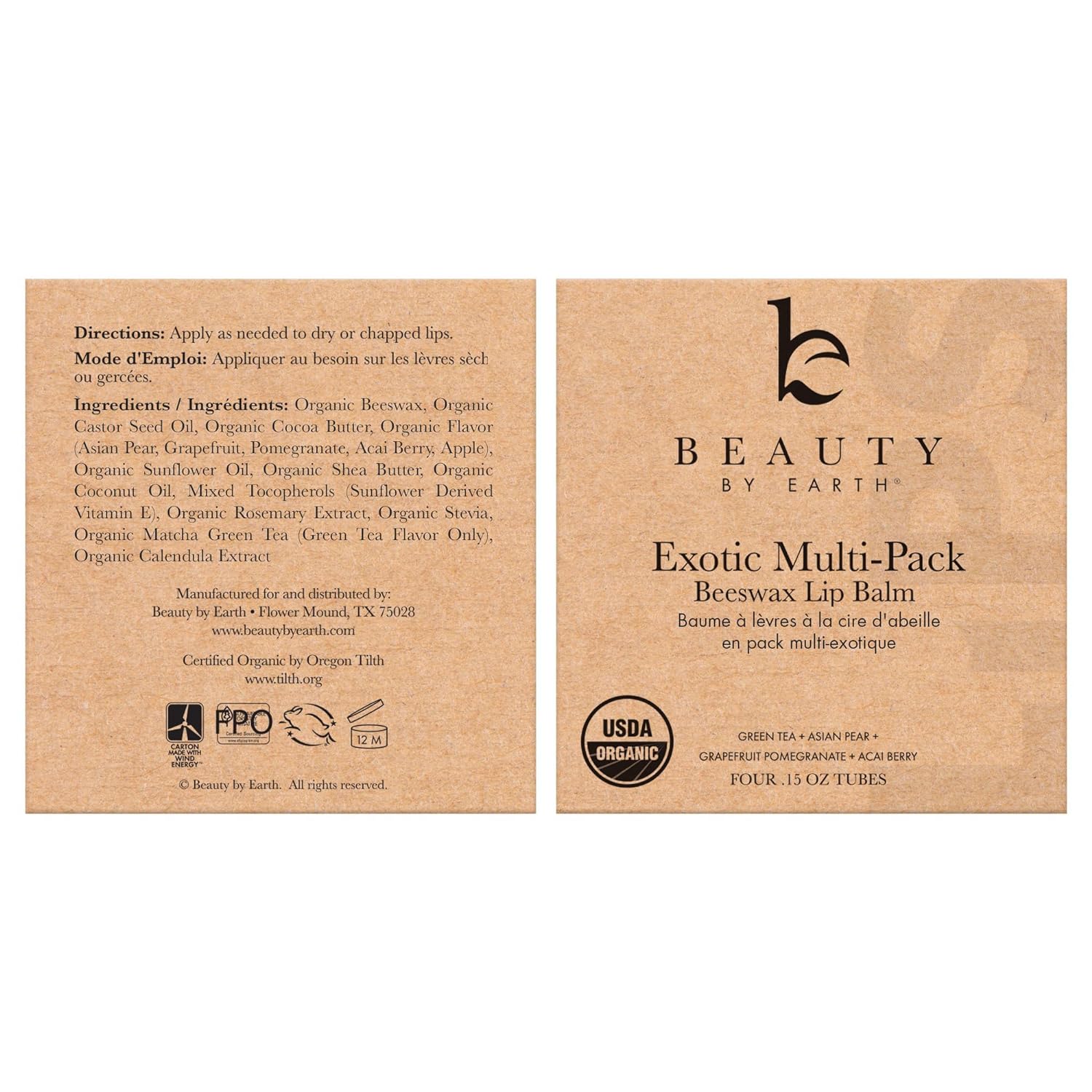
Organic Lip Balm Set - Hydrating Flavors for All, Natural Ingredients - 4 Pack


Citrus Grandis (Grapefruit)
High RiskCitrus grandis (grapefruit) is a plant material commonly used in various products for its aromatic properties and potential skin benefits. It is often incorporated in cosmetics and personal care products for fragrance, antioxidant qualities, and as a natural preservative.
Sustai Insights
Citrus grandis offers functional benefits such as its antioxidant properties and natural fragrance, contributing positively to product formulations. However, it has a high allergenic potential, posing risks of skin and immunotoxic reactions. Environmental concerns include moderate persistence and bioaccumulation, raising ecotoxicity issues. Regulatory bodies have placed restrictions on its use in certain products, leading to an overall high-risk assessment. Safe usage practices are recommended, and alternatives like other citrus extracts or synthetic fragrances may be considered for reduced allergenic potential.
Camellia Sinensis (Green Tea) Leaf Extract
Medium RiskCamellia sinensis (green tea) leaf extract is derived from the leaves of the Camellia sinensis plant, primarily known for its antioxidant properties. It is commonly used in cosmetic formulations for its potential to soothe the skin and provide protective benefits against environmental stressors.
Sustai Insights
Camellia sinensis leaf extract offers functional benefits, including antioxidant properties that may protect the skin from damage and enhance product efficacy. While generally regarded as safe, it presents moderate allergenic potential and low concerns for carcinogenic or reproductive toxicity. Environmental risks are minimal; however, the sourcing practices should be evaluated for sustainability. Regulatory bodies do not impose significant restrictions, indicating a low-risk profile overall. Safe usage practices are advisable, and alternatives include other botanical extracts with similar benefits.
Ricinus Communis (Castor) Seed Oil
Medium RiskCastor oil is extracted from the seeds of Ricinus communis and is commonly used in cosmetic and personal care products for its moisturizing and emollient properties. It is known for its ability to enhance skin absorption and provide a protective barrier.
Sustai Insights
Castor oil offers functional benefits as a moisturizer and emollient, enhancing skin absorption and providing a barrier against moisture loss. It is sustainably sourced and biodegradable. However, potential health risks include low levels of irritation and moderate concerns regarding developmental and reproductive toxicity. Environmental risks are low, with no significant pollutant or bioaccumulation concerns reported. Regulatory status shows no current restrictions. Overall, the risk level is assessed as medium, with recommendations for safe usage practices, and potential alternatives include other plant-based oils.
Theobroma Cacao (Cocoa) Seed Butter
Low RiskTheobroma cacao (cocoa) seed butter is extracted from the roasted seeds of the cocoa plant. It is commonly used in cosmetics and skincare products for its emollient properties, helping to moisturize and soften the skin. Cocoa butter is also known for its stability and resistance to rancidity.
Sustai Insights
Cocoa butter is recognized for its effective moisturizing properties and is sustainably sourced, contributing to its appeal in personal care products. It poses low health risks, with minimal concerns regarding carcinogenicity, allergies, or reproductive toxicity. Environmentally, it does not significantly contribute to pollution or bioaccumulation. Regulatory bodies impose few restrictions, affirming its safety. Overall, the risk associated with cocoa seed butter is low, making it a favorable ingredient in cosmetics. Alternatives include shea butter or plant oils for similar emollient benefits.
Helianthus Annuus (Sunflower) Seed
Low RiskHelianthus annuus (sunflower) seed is derived from the seeds of the sunflower plant and is commonly used in various cosmetic and personal care products. It serves primarily as an emollient and skin conditioning agent, providing moisture and enhancing the texture of formulations.
Sustai Insights
Helianthus annuus (sunflower) seed offers functional benefits, including skin conditioning and moisturizing properties, while being sustainably sourced and biodegradable. Health risks are minimal, with low concerns for carcinogenicity, allergies, and reproductive toxicity. Environmentally, it presents low risks of pollution or bioaccumulation. Regulatory assessments indicate no current restrictions. Overall, it is considered a low-risk ingredient, and safe usage practices should be maintained. Alternative ingredients may include other plant-based oils, but the sunflower seed oil remains a viable option.
Cocos Nucifera (Coconut) Oil
Low RiskCocos Nucifera (Coconut) Oil is derived from the kernels of the coconut palm. It is primarily used in cosmetic formulations for its emollient and moisturizing properties, making it suitable for skin and hair care products.
Sustai Insights
Coconut oil serves as an effective moisturizer and emollient, promoting skin hydration and softness. It is sustainably sourced and biodegradable. Health risks are minimal, with low concerns regarding carcinogenicity, allergens, and reproductive toxicity. Environmental impact is also low, as it does not contribute significantly to pollution or bioaccumulation. Regulatory bodies have not issued restrictions on its use. Overall, coconut oil presents a low risk for health and environmental concerns, making it a safe ingredient in cosmetic products.
Tocopherol, D Alpha
Low RiskTocopherol, specifically d-alpha tocopherol, is a naturally occurring form of Vitamin E. It is commonly used in cosmetic and personal care products primarily for its antioxidant properties, helping to protect formulations from oxidation and extend shelf life.
Sustai Insights
D-alpha tocopherol provides effective antioxidant benefits, contributing to product stability. It is sustainably sourced and generally regarded as safe, with low concerns regarding carcinogenicity, allergies, and reproductive toxicity. However, there are minor concerns about endocrine disruption. Regulatory bodies have not imposed significant restrictions, indicating low overall risk. Recommended usage practices include adhering to established safe concentration thresholds. Alternatives, such as other forms of Vitamin E or plant-based antioxidants, may also be considered.
Punica Granatum (Pomegranate)
Low RiskPunica granatum, commonly known as pomegranate, is a fruit-derived ingredient used in various cosmetic and personal care products. It is primarily recognized for its antioxidant properties and is often included for its potential benefits in skin health and hydration.
Sustai Insights
Pomegranate is valued for its antioxidant benefits, which may help protect skin from oxidative stress. It is generally considered low risk regarding health concerns, with minimal evidence linking it to carcinogenicity, allergies, or reproductive toxicity. Environmentally, it poses low risks as it is not classified as a pollutant or bioaccumulative. Regulatory assessments indicate no current restrictions. Safe usage practices should be followed, with potential alternatives including other fruit extracts for similar benefits. Overall, the ingredient presents a low risk profile.
Pyrus Communis (Pear) Fruit
Low RiskPyrus communis (pear) fruit is the edible fruit of the pear tree, known for its sweet taste and juicy texture. It is commonly used in various food products, cosmetics, and skincare formulations due to its hydrating and skin-soothing properties.
Sustai Insights
Pyrus communis (pear) fruit offers several functional benefits, including moisturizing and antioxidant properties, making it suitable for skin care applications. It is sustainably sourced and generally regarded as safe, with low concerns for carcinogenicity, allergenic potential, or reproductive toxicity. Environmental risks are minimal, and it does not contribute to significant pollution. Regulatory status is favorable, with no current restrictions. Overall, the ingredient presents a low risk profile, and it can be substituted with other fruit extracts if desired.
Theobroma Cacao (Cocoa) Seed Butter
Low RiskTheobroma cacao (cocoa) seed butter is extracted from the roasted seeds of the cocoa plant. It is commonly used in cosmetics and skincare products for its emollient properties, helping to moisturize and soften the skin. Cocoa butter is also known for its stability and resistance to rancidity.
Sustai Insights
Cocoa butter is recognized for its effective moisturizing properties and is sustainably sourced, contributing to its appeal in personal care products. It poses low health risks, with minimal concerns regarding carcinogenicity, allergies, or reproductive toxicity. Environmentally, it does not significantly contribute to pollution or bioaccumulation. Regulatory bodies impose few restrictions, affirming its safety. Overall, the risk associated with cocoa seed butter is low, making it a favorable ingredient in cosmetics. Alternatives include shea butter or plant oils for similar emollient benefits.
Helianthus Annuus (Sunflower) Seed
Low RiskHelianthus annuus (sunflower) seed is derived from the seeds of the sunflower plant and is commonly used in various cosmetic and personal care products. It serves primarily as an emollient and skin conditioning agent, providing moisture and enhancing the texture of formulations.
Sustai Insights
Helianthus annuus (sunflower) seed offers functional benefits, including skin conditioning and moisturizing properties, while being sustainably sourced and biodegradable. Health risks are minimal, with low concerns for carcinogenicity, allergies, and reproductive toxicity. Environmentally, it presents low risks of pollution or bioaccumulation. Regulatory assessments indicate no current restrictions. Overall, it is considered a low-risk ingredient, and safe usage practices should be maintained. Alternative ingredients may include other plant-based oils, but the sunflower seed oil remains a viable option.
Camellia Sinensis (Green Tea) Leaf Extract
Medium RiskCamellia sinensis (green tea) leaf extract is derived from the leaves of the Camellia sinensis plant, primarily known for its antioxidant properties. It is commonly used in cosmetic formulations for its potential to soothe the skin and provide protective benefits against environmental stressors.
Sustai Insights
Camellia sinensis leaf extract offers functional benefits, including antioxidant properties that may protect the skin from damage and enhance product efficacy. While generally regarded as safe, it presents moderate allergenic potential and low concerns for carcinogenic or reproductive toxicity. Environmental risks are minimal; however, the sourcing practices should be evaluated for sustainability. Regulatory bodies do not impose significant restrictions, indicating a low-risk profile overall. Safe usage practices are advisable, and alternatives include other botanical extracts with similar benefits.
Cocos Nucifera (Coconut) Oil
Low RiskCocos Nucifera (Coconut) Oil is derived from the kernels of the coconut palm. It is primarily used in cosmetic formulations for its emollient and moisturizing properties, making it suitable for skin and hair care products.
Sustai Insights
Coconut oil serves as an effective moisturizer and emollient, promoting skin hydration and softness. It is sustainably sourced and biodegradable. Health risks are minimal, with low concerns regarding carcinogenicity, allergens, and reproductive toxicity. Environmental impact is also low, as it does not contribute significantly to pollution or bioaccumulation. Regulatory bodies have not issued restrictions on its use. Overall, coconut oil presents a low risk for health and environmental concerns, making it a safe ingredient in cosmetic products.
Ricinus Communis (Castor) Seed Oil
Medium RiskCastor oil is extracted from the seeds of Ricinus communis and is commonly used in cosmetic and personal care products for its moisturizing and emollient properties. It is known for its ability to enhance skin absorption and provide a protective barrier.
Sustai Insights
Castor oil offers functional benefits as a moisturizer and emollient, enhancing skin absorption and providing a barrier against moisture loss. It is sustainably sourced and biodegradable. However, potential health risks include low levels of irritation and moderate concerns regarding developmental and reproductive toxicity. Environmental risks are low, with no significant pollutant or bioaccumulation concerns reported. Regulatory status shows no current restrictions. Overall, the risk level is assessed as medium, with recommendations for safe usage practices, and potential alternatives include other plant-based oils.
Tocopherol, D Alpha
Low RiskTocopherol, specifically d-alpha tocopherol, is a naturally occurring form of Vitamin E. It is commonly used in cosmetic and personal care products primarily for its antioxidant properties, helping to protect formulations from oxidation and extend shelf life.
Sustai Insights
D-alpha tocopherol provides effective antioxidant benefits, contributing to product stability. It is sustainably sourced and generally regarded as safe, with low concerns regarding carcinogenicity, allergies, and reproductive toxicity. However, there are minor concerns about endocrine disruption. Regulatory bodies have not imposed significant restrictions, indicating low overall risk. Recommended usage practices include adhering to established safe concentration thresholds. Alternatives, such as other forms of Vitamin E or plant-based antioxidants, may also be considered.
Citrus Grandis (Grapefruit)
High RiskCitrus grandis (grapefruit) is a plant material commonly used in various products for its aromatic properties and potential skin benefits. It is often incorporated in cosmetics and personal care products for fragrance, antioxidant qualities, and as a natural preservative.
Sustai Insights
Citrus grandis offers functional benefits such as its antioxidant properties and natural fragrance, contributing positively to product formulations. However, it has a high allergenic potential, posing risks of skin and immunotoxic reactions. Environmental concerns include moderate persistence and bioaccumulation, raising ecotoxicity issues. Regulatory bodies have placed restrictions on its use in certain products, leading to an overall high-risk assessment. Safe usage practices are recommended, and alternatives like other citrus extracts or synthetic fragrances may be considered for reduced allergenic potential.
Punica Granatum (Pomegranate)
Low RiskPunica granatum, commonly known as pomegranate, is a fruit-derived ingredient used in various cosmetic and personal care products. It is primarily recognized for its antioxidant properties and is often included for its potential benefits in skin health and hydration.
Sustai Insights
Pomegranate is valued for its antioxidant benefits, which may help protect skin from oxidative stress. It is generally considered low risk regarding health concerns, with minimal evidence linking it to carcinogenicity, allergies, or reproductive toxicity. Environmentally, it poses low risks as it is not classified as a pollutant or bioaccumulative. Regulatory assessments indicate no current restrictions. Safe usage practices should be followed, with potential alternatives including other fruit extracts for similar benefits. Overall, the ingredient presents a low risk profile.
Pyrus Communis (Pear) Fruit
Low RiskPyrus communis (pear) fruit is the edible fruit of the pear tree, known for its sweet taste and juicy texture. It is commonly used in various food products, cosmetics, and skincare formulations due to its hydrating and skin-soothing properties.
Sustai Insights
Pyrus communis (pear) fruit offers several functional benefits, including moisturizing and antioxidant properties, making it suitable for skin care applications. It is sustainably sourced and generally regarded as safe, with low concerns for carcinogenicity, allergenic potential, or reproductive toxicity. Environmental risks are minimal, and it does not contribute to significant pollution. Regulatory status is favorable, with no current restrictions. Overall, the ingredient presents a low risk profile, and it can be substituted with other fruit extracts if desired.
Discover the Organic Lip Balm Multi Flavor Set, a delightful collection designed for hydration and care. Made in the USA with all-natural ingredients, this set is perfect for the whole family—offering safe, effective lip moisturization without petroleum.
- Hydration & Care: Formulated with organic beeswax and nourishing oils, these balms deeply moisturize dry, chapped lips, providing long-lasting hydration.
- Family-Friendly Flavors: Enjoy four delicious flavors—Asian Pear, Pomegranate, Acai Berry, and Green Tea—making lip care fun for kids and adults alike.
- Ideal Gift Set: Perfect as a thoughtful birthday gift or a small self-care treat, this lip balm set is a versatile choice for any occasion.
- Eco-Conscious Choice: Made from organic materials, this balm set supports sustainable practices, allowing you to care for your lips and the environment simultaneously.
- Satisfaction Guaranteed: As a family-owned business based in Dallas, TX, customer satisfaction is prioritized, ensuring quality and care in every purchase.
Empower your lip care routine with this organic gift set that combines flavor, fun, and functionality.
Subscribe & Save with Sustai
- Best Price Guarantee: Always enjoy the lowest prices on sustainable home essentials.
- No Surprises: We’ll notify you before shipping. No hidden fees, ever.
- You’re in Charge: Change, pause, or cancel your subscription anytime with ease.
- Eco-Friendly Deliveries: Our grouped shipments mean less packaging and lower emissions.
Join us on a sustainable journey. Special offers for a limited time! Prices and promotions may change.
Recommended Products
Discover the Organic Lip Balm Multi Flavor Set, a delightful collection designed for hydration and care. Made in the USA with all-natural ingredients, this set is perfect for the whole family—offering safe, effective lip moisturization without petroleum.
- Hydration & Care: Formulated with organic beeswax and nourishing oils, these balms deeply moisturize dry, chapped lips, providing long-lasting hydration.
- Family-Friendly Flavors: Enjoy four delicious flavors—Asian Pear, Pomegranate, Acai Berry, and Green Tea—making lip care fun for kids and adults alike.
- Ideal Gift Set: Perfect as a thoughtful birthday gift or a small self-care treat, this lip balm set is a versatile choice for any occasion.
- Eco-Conscious Choice: Made from organic materials, this balm set supports sustainable practices, allowing you to care for your lips and the environment simultaneously.
- Satisfaction Guaranteed: As a family-owned business based in Dallas, TX, customer satisfaction is prioritized, ensuring quality and care in every purchase.
Empower your lip care routine with this organic gift set that combines flavor, fun, and functionality.

You can have at most 2 Sustainable Steals products in your cart
Customer Reviews
Customers’ View
Customers appreciate the hydrating properties and natural formulation of this lip balm set, with many noting it effectively alleviates dry lips. Users highlight the smooth texture and pleasant flavors, with comments such as "my lips are softer than ever" and "this is the only chapstick that works and doesn't need constant reapplying." The organic ingredients are particularly valued by health-conscious consumers, as they ensure safety for all ages. However, some feedback indicates inconsistency in texture, with a few users experiencing coarse particles in some balms. Overall, customers find this product effective and aligned with their sustainable lifestyle, reinforcing its appeal to eco-friendly consumers.
AI-generated from the text of customer reviewsThis product is rated 4.5 of 5.0 stars.
It has received 21 reviews.




